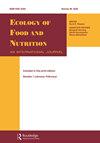A Review of Food Insecurity and Chronic Cardiovascular Disease: Implications during the COVID-19 Pandemic.
IF 1.7
4区 医学
Q4 NUTRITION & DIETETICS
引用次数: 6
Abstract
ABSTRACT Cardiovascular disease is the leading cause of death and disability globally. Self-management of cardiovascular disease includes the consumption of nutrient-dense foods and prudent dietary patterns, such as the DASH (Dietary Approaches to Stop Hypertension) and Mediterranean Diet to decrease inflammation and stress. Over the last few decades, there has been a growing interest in food insecurity and health outcomes in the United States. While it is well established that diet plays a role in the development of cardiovascular disease, there is little known regarding the role of food insecurity and cardiovascular disease. As a result of unprecedented unemployment rates during and following the global COVID-19 pandemic, all dimensions of food insecurity have been impacted, including declines in food availability, accessibility, utilization, and stability. This paper summarizes the existing quantitative and qualitative literature exploring the social determinants of health (economics/poverty, employment, limited access to health care, and food) that affect the self-management of cardiovascular disease, including healthy nutrition, highlighting special considerations during the COVID-19 global pandemic.

粮食不安全与慢性心血管疾病综述:2019冠状病毒病大流行期间的影响
心血管疾病是全球死亡和残疾的主要原因。心血管疾病的自我管理包括食用营养丰富的食物和谨慎的饮食模式,如DASH(停止高血压的饮食方法)和地中海饮食,以减少炎症和压力。在过去的几十年里,在美国,人们对食品安全和健康结果的兴趣越来越大。众所周知,饮食在心血管疾病的发展中起着重要作用,但人们对粮食不安全和心血管疾病的作用知之甚少。在2019冠状病毒病全球大流行期间和之后,由于前所未有的失业率,粮食不安全的各个方面都受到了影响,包括粮食供应、可及性、利用率和稳定性下降。本文总结了现有的定量和定性文献,探讨了影响心血管疾病自我管理(包括健康营养)的健康社会决定因素(经济/贫困、就业、有限的医疗保健机会和食物),并强调了在COVID-19全球大流行期间的特殊考虑。
本文章由计算机程序翻译,如有差异,请以英文原文为准。
求助全文
约1分钟内获得全文
求助全文
来源期刊
CiteScore
3.50
自引率
0.00%
发文量
23
审稿时长
>12 weeks
期刊介绍:
Ecology of Food and Nutrition is an international journal of food and nutrition in the broadest sense. The journal publishes peer-reviewed articles on all aspects of food and nutrition -- ecological, biological, and cultural. Ecology of Food and Nutrition strives to become a forum for disseminating scholarly information on the holistic and cross-cultural dimensions of the study of food and nutrition. It emphasizes foods and food systems not only in terms of their utilization to satisfy human nutritional needs and health, but also to promote and contest social and cultural identity. The content scope is thus wide -- articles may focus on the relationship between food and nutrition, food taboos and preferences, ecology and political economy of food, the evolution of human nutrition, changes in food habits, food technology and marketing, food and identity, and food sustainability. Additionally, articles focusing on the application of theories and methods to address contemporary food and nutrition problems are encouraged. Questions of the relationship between food/nutrition and culture are as germane to the journal as analyses of the interactions among nutrition and environment, infection and human health.

 求助内容:
求助内容: 应助结果提醒方式:
应助结果提醒方式:


